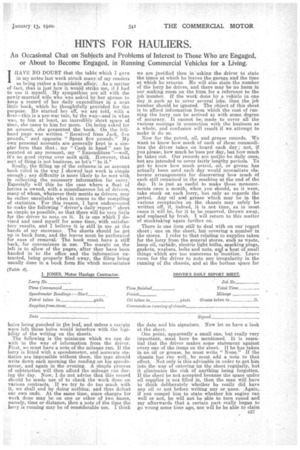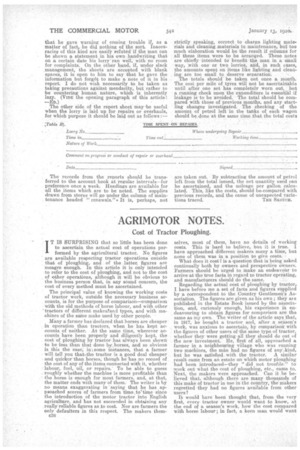HINTS FOR HAULIERS.
Page 19

Page 20

If you've noticed an error in this article please click here to report it so we can fix it.
An Occasional Chat on Subjects and Problems of Interest to Those Who are Engaged, or About to Become Engaged, in Running Commercial Vehicles for a Living.
IHAVE NO DOUBT that the table which I gave in my notes last week struck many of my readers as being rather a formidable affair. , As a matter of fact, that is just how it would strike me, if I had to use it thyself. My sympathies are all with the newly-married wife who was asked by her spouse to keep a record of her daily expenditure in a neat little book, which he thoughtfully provided for the purpose. He started her off, we are told, with a fiver—this is a pre-war tale, by the way—and in what was, to him at least, an incredibly short space of time, she came to him for more. On being asked for an account, she presented the book. On the lefthand page was written " Received from Jack, five pounds," and opposite " Spent five pounds." My own personal accounts are generally kept in a simpler form than that ; my " 'Cash in hand" can be counted at any moment, my "Expenditure "—well, it's no good crying over spilt Milk. However, that sort of thing is not business, so let's " to it." Really, the filling up of the columns in an account .book ruled in the way I showed last week is simple enough ; any difficulty is more likely to be met with in collecting the necessary information for entry.' Eapecially will this be the case where a feet of lorries is owned, with a miscellaneous lot of drivers, many of wham, whatever their merits as drivers, may be rather unreliable when it comes to the compiling of statistics. For this reason, I have endeavoured to make the following "driver's daily report" sheet as simple as possible, 80 that there will be very little for the, driver to note on it. It is one which I devised and used myself, for some time, with satisfactory results, and I believe it is still in use at the hands of my successor. The sheets should be got up in book form, and the leaves must be perforated for ease of removal. The book must have a stiff back, for convenience in use. The margin on the left is to allow of the pages, after they have been handed in 'to the office and the information extracted, being properly filed away, the filing being usually done in a book form file which necessitates
holes being punched in the leaf, and unless a margin were left these holes would interfere with the legibility of the writing on the sheets.
The following is the minimum which we can do with in the way of information from the driver. First, we must have a note of the mileage run. If the lorry is fitted with a speedometer, and accurate statistics are impossible without them, the man should write down each morning the reading on his speedometer, and again in the evening. A simple process of subtraction will then afford the mileage run during the day. Now, I do not advise that this record should be made use of to check the work done on various contracts. If we try to do too much with it, we shall end by doing nothing, and thus defeat our own ends. At the same time, since charges for work done may be, on one or other of two bases, namely, time, or distance, then a note of the time the lorry is running may be of considerable use. I think we are justified then in asking the driver to state the times at which he leaves the garage and the time at which he returns. He will also state the number of the lorry he drives, and there may be no harm in our making room on the form for a reference to the job 'number. If the work done by a vehicle in one day is such as to cover several jobs, then the job number should be ignored. The object of this sheet is to afford information from which the cost of running the lorry can be arrived at with some degree of accuracy. It cannot be. made to cover all the various costings in connection with the business as a. whole, and confusion will result if we attempt to make it do so.
Now for the petrol, oil, and grease records. We want to know how much of each of these commodities the driver takes on board each day ; not, if you please, how much heuses per day, but how much he takes out. Our records are nogto be daily ones, but are intended to cover fairly lengthy periods. To get to know bow much petrol, oil, or grease has actually been used each day would necessitate
borate arrangements for discovering how much of each still remained in the machine at the end of the day. It is just as useful to make these measurements once a month, when you should, as. it were, take stock on each lorry, but only as regards the petrol.. Any oil am' grease which may be in the various receptacles on the chassis may safely be written 'off, if, indeed, it is not time, as in most eases it will be, for it to be removed, thrown away, and replaced by fresh. J will return to this matter of stocktaking again further on.
There is one item still to deal with on our reuort sheet ; one on the sheet, but covering a number in the stores. I refer to that relating to supplies taken for the lorry from the general stores, such as waste, lamp oil, carbide, electric light bulbs, sparking plugs, gaskets, washers, bolts and nuts, ansd a host of small things which are too numerous to'nriention. -Leave room for the driver to note any irregularity in the running of the chassis, and at the bottom space for the date and his signature. Now let us have a look at the sheet.
One point, apparently a small one, but really very important, must here be mentioned. It is essential that the driver makes some statement against every one of the items on the sheet. If he has taken in no oil or grease, he must write "None." If the chassis has run well, he must add a note to that effect Not only is this advisable in order to get him into the way of entering hp the sheet regularly, but it eliminates the risk of anything being forgotten. If the sheet be not accepted because the space under oil supplies is not filled in, then the man will have to think deliberately whether he really did have any oil or not before writing any or none. Again., if you compel him to state whether his engine ran well or not, he will not be able to turn round and say afterwards that a, certain part really began to go wrong some time ago, nor ,will he be able to claim that he gave warning of coming trouble if as a matter of fact, he did nothing of the sort. Inaccuracies of this kind are easilY refuted if the man can be shown a statement in his own handwriting that on o, certain date his lorryran well, with no room for complaints. On the other hand, if, under slack management, the sheets are accepted with blank spaces, it is open to him to say that he gave the information but forgeit to make a note of it in his report. I do not wish necessarily to be taken as taking precautions against mendacity, but rather to be countering hilinan nature, which is inherently lazy. (Vint the opening paragraph of this article? —ED.)
The other side of the report sheet may -be useful when the lorry is laid up for repairs or overhauls, for which purpose it should be laid out as follows:— The records from the reports should be transferred to the account book at regular intervals—for preference once a week. Headings are available for all the items which are to be noted. The supplies drawn from stores will go under the column of maintenance headed "renewals.". It is, perhaps, not
strictly speaking, correct to charge lighting materials and cleaning materials to maintenance, •but. too much elaboration would be the result if columns for all these items were to be arranged. These notes are chiefly intended to benefit the man in a" iniall way, ;with one or two lorries, and, in such cases, the amounts spent on items like lighting and cleaning are too small to deserve separation.
The totals should be taken out once a month. The cost per mile of tyres Will not be ascertainable until after one set has completely worn out, but a running check upon the expenditure is essential if leakage is to be avoided. The total should be compared with those of previous months, and any startling changes investigated. The checking of the amount of petrol left in the tanks of each wagon should be done at the same time that the total costs
are taken out. By subtracting the amount of petrol left from the total issued, the net ouantity used can be ascertained, and the mileage per gallon calm-. lated. This, like the costs, should be•compared 'with previous records, and the cause of unexpected varia
tions traced. . THE SKOiCH.


























